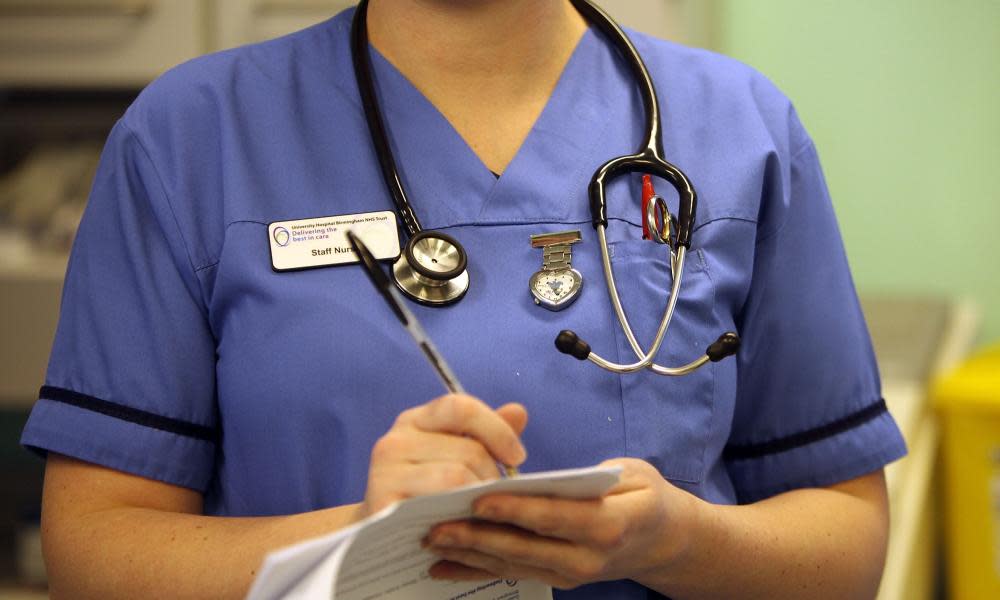Labour will give pay rise to 'overworked and underpaid' NHS staff

Labour would pay for a big pay rise for NHS workers who have been “ignored and insulted” by the Conservatives by raising corporation tax if the party wins the election.
Jonathan Ashworth, the shadow health secretary, said NHS staff had been undervalued, overworked and underpaid under the Tories, after years of pay freezes for nurses, midwives and other key workers.
He also pledged Labour would “end Tory privatisation in the NHS” by reversing all moves to bring private providers into the health service.
Ashworth told BBC Radio 4’s Today programme the party would reveal in its manifesto how much it would increase corporation tax for businesses, which has been repeatedly cut by former chancellor George Osborne in recent years. He said independent low-pay advisers would specify how big rises for NHS staff should be but it would take into account the cost of living.
Ashworth said the NHS was “getting worse” as a result of shameful low pay for workers and inadequate staffing levels.
“We will give the NHS the funding it needs,” Ashworth said, arguing that Theresa May has lied about how much the government is giving to the NHS as well as claiming she would not call an election.
Speaking on the same programme, Jeremy Hunt, the health secretary, said he would like to pay NHS staff more but suggested it would be too expensive to do so.
“I would certainly agree NHS staff do a brilliant job and we would certainly like to pay them more than we are able to at the moment, but we have had to face a very difficult period financially,” he said.
Challenged over his own pay rise as an MP, he told ITV: “Ministers have actually given themselves a pay cut – that’s the only pay we have control over. I have accepted my pay rise as an MP and my pay cut as a minister and that’s the point: all ministers have done because we recognise we have to set an example.”
Hunt deflected questions about NHS policy by saying the health service would only be strong if May is elected again to implement Brexit.
In March, the government announced that about 1.3 million NHS staff would receive a 1% pay rise but critics pointed out that as a result nurses, midwives and radiographers would earn barely £5 a week more.
The settlement for 2017-18 is the sixth year in a row in which NHS staff’s annual pay rise has been lower than the cost of living – inflation is running at 3.2%.
Labour plans to lift the 1% cap on pay rises for NHS staff and move towards public sector wages being agreed through collective bargaining and the evidence of independent pay review bodies.
At the Unison health conference in Liverpool, Ashworth will say: “Our NHS staff are the very pride of Britain. Yet they are ignored, insulted, undervalued, overworked and underpaid by this Tory government. Not any more. Enough is enough.
“NHS staff have been taken for granted for too long by the Conservatives. Cuts to pay and training mean hard-working staff are being forced from NHS professions and young people are being put off before they have even started. Now Brexit threatens the ability of health employers to recruit from overseas.
Labour also plans to create legislation requiring NHS trusts to have regard for patient safety when setting staffing levels, as “Tory mismanagement” has left the health service “dangerously understaffed”.
It will ask the National Institute for Health and Care Excellence to assess whether legally enforced staffing ratios should be introduced in some health settings. The party will also reinstate funding and support for students of health-related degrees and incentivise NHS jobs to boost staffing levels.
Ashworth will say: “What is bad for NHS staff is bad for patients too. Short staffing means reduced services and a threat to patient safety. Labour’s new guarantees for NHS staff will help keep services running at the standard which England’s patients expect.”
The move was welcomed by unions and representative bodies.
Jon Skewes, the director for policy, employment relations and communications of the Royal College of Midwives, said: “These are very welcome commitments from the Labour party. They recognise the effort, determination and commitment on the part of our hard-working midwives and other NHS staff to deliver the safest and best possible care for those using the NHS.”
He also criticised the government for abolishing NHS bursaries, which had led to a fall by 23% of applications by students in England to nursing and midwifery courses at British universities.
The government’s policy of a 1% pay cap amounts to a drop in real wages, the TUC has calculated. Adjusting for inflation, a nurse, for example, would have earned £30,929 in 2010, but only £28,462 last year.
There are 24,000 nursing vacancies, according to the Royal College of Nursing, as roles become harder to fill.

 Yahoo News
Yahoo News 
